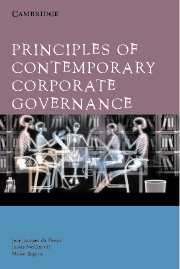Book contents
- Frontmatter
- Contents
- Table of cases
- Table of statutes
- Preface
- PART ONE CORPORATE GOVERNANCE: AN OVERVIEW
- PART TWO CORPORATE GOVERNANCE IN AUSTRALIA
- PART THREE CORPORATE GOVERNANCE IN PRACTICE
- 9 Implementation of the ASX Best Practice Recommendations: charters, policies and codes
- 10 Auditors and audits
- 11 Directors' duties and liability
- PART FOUR CORPORATE GOVERNANCE: AN INTERNATIONAL PERSPECTIVE
- PART FIVE CORPORATE GOVERNANCE: GOING FORWARD
- Index
11 - Directors' duties and liability
- Frontmatter
- Contents
- Table of cases
- Table of statutes
- Preface
- PART ONE CORPORATE GOVERNANCE: AN OVERVIEW
- PART TWO CORPORATE GOVERNANCE IN AUSTRALIA
- PART THREE CORPORATE GOVERNANCE IN PRACTICE
- 9 Implementation of the ASX Best Practice Recommendations: charters, policies and codes
- 10 Auditors and audits
- 11 Directors' duties and liability
- PART FOUR CORPORATE GOVERNANCE: AN INTERNATIONAL PERSPECTIVE
- PART FIVE CORPORATE GOVERNANCE: GOING FORWARD
- Index
Summary
There are no qualifications for being a company director. Even directors of listed companies do not have to take any examinations … In principle, anyone can become a director. One might therefore think that the duties of an office so unexacting in its qualifications would be simple and easy to ascertain. In fact, this is far from the case. In fact, the duties of directors can be discovered only by examining at least three different sources which lie like strata one above the other. The bedrock is the duties which directors owe at common law, or more precisely in equity, simply because they are managing other people's property. Over that layer has been imposed a number of specific statutory duties intended to reinforce the duties at common law. And over that layer has been imposed still further duties under various self-regulatory codes, which are also intended to reinforce the common law duties in areas not thought suitable for legislation.
Lord Hoffman, ‘Duties of Company Directors’ (1999) 10 European Business Law Review 78.The governance of a public company should be about stewardship. Those in control have a duty to act in the best interests of the company. They must use the company's resources productively. They must understand that those resources are not personal property. The last years of HIH were marked by poor leadership and inept management. Indeed, an attitude of apparent indifference to, or deliberate disregard of, the company's underlying problems pervades the affairs of the group.
Those responsible for the stewardship of HIH ignored the warning signs at their own, the group's and the public's peril. […]
- Type
- Chapter
- Information
- Principles of Contemporary Corporate Governance , pp. 258 - 291Publisher: Cambridge University PressPrint publication year: 2005



